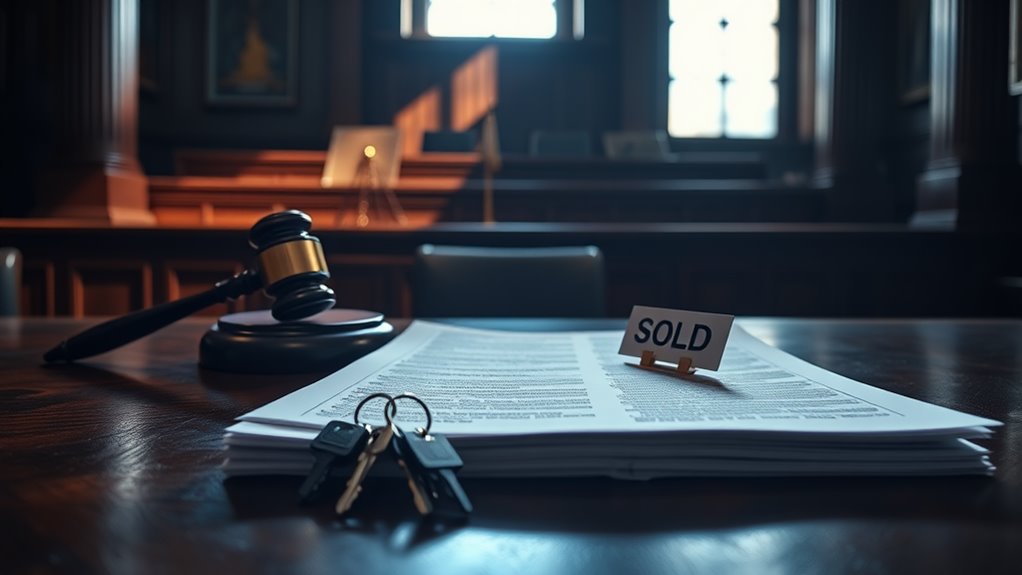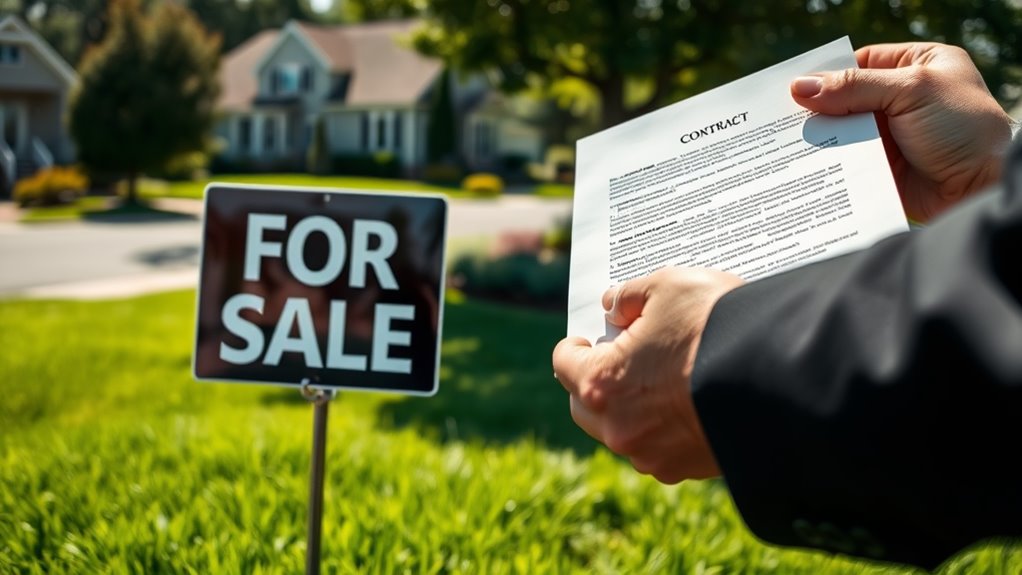Property ownership comes with significant costs and responsibilities, so there’s no such thing as free real estate. You’ll face ongoing expenses like maintenance, utilities, and property taxes, which can add up quickly. Liability risks and insurance needs further complicate ownership. Hidden fees and long-term commitments often outweigh initial perks. Understanding these financial and legal obligations is essential to avoid surprises. Explore further to uncover how these factors impact your real estate journey.
Key Takeaways
- Hidden fees like taxes and closing costs make “free real estate” non-existent.
- Ongoing maintenance expenses require 1% to 3% of property value annually.
- Property taxes and insurance premiums add to the financial burden.
- Liability coverage is essential to protect against legal and financial risks.
- Long-term financial commitments, including mortgages, escalate total ownership costs.
The Cost of Ownership in Real Estate
When you purchase real estate, you’re committing to more than just the initial price. The cost of ownership extends far beyond the sale, encompassing expenses like property taxes, maintenance, and insurance. For a $350,000 home, annual upkeep alone can range from $3,500 to $10,500, or 1% to 3% of the property’s value. Add in utilities, which average $200 to $400 monthly, and the financial burden grows. Mortgage interest further inflates costs; a 30-year loan at 4% on that $350,000 home could add over $250,000 to your total payments. These ongoing obligations debunk the free real estate meme, highlighting that ownership demands substantial, sustained investment. By understanding these hidden costs, you can better prepare for the long-term financial reality of owning property, ensuring you’re not caught off guard by the cumulative expenses of maintaining your investment. Incorporating rental market analysis into your strategy can help identify optimal pricing and maximize returns on your property.
Financial Obligations of Property Acquisition
You’ll face substantial initial purchase costs, including down payments and closing fees, which can total tens of thousands of dollars. Ongoing maintenance expenses, such as repairs and regular upkeep, can add 1% to 2% of the property’s value annually to your budget. Additionally, using a Long Term Rental Calculator can help you assess these financial obligations and plan for profitability. These financial obligations make property acquisition far from a one-time expense.
Initial Purchase Costs
Initial purchase costs in property acquisition demand careful financial planning and thorough understanding. These upfront expenses can greatly impact your budget, so it is crucial to account for all potential outlays. Key costs include:
- Down payment: Typically ranging from 3% to 20% of the property’s price, depending on the loan type and lender requirements.
- Closing costs: Generally between 2% to 5% of the loan amount, covering fees like appraisal, title insurance, and legal services.
- Home inspection: An important expense, usually costing $300 to $500, to uncover potential property issues before purchase.
- Property taxes: A recurring yet significant factor, varying by location, that affects your overall financial commitment.
Exploring down payment assistance programs can help reduce initial financial burdens for eligible buyers.
Ongoing Maintenance Expenses
Even if you acquire property without upfront costs, ongoing maintenance expenses can quickly become a significant financial burden. You’ll face recurring costs like repairs, landscaping, and utilities, which can strain your budget over time. Homeowners typically spend 1% to 3% of a property’s value annually on maintenance, and these expenses add up. Property taxes, based on the home’s assessed value, also represent a substantial financial commitment. Additionally, you’ll need insurance to protect your property, with premiums averaging around $1,500 per year in the U.S., depending on its location and value. Unexpected costs, such as emergency repairs or replacing essential systems like HVAC or plumbing, can further escalate expenses. Even if your property seems “free” initially, these ongoing maintenance obligations guarantee it’s never truly cost-free. Regular performance reporting can help property owners track expenses and optimize rental income stability.
Legal Responsibilities of Real Estate Ownership

You must pay property taxes based on location and value, as unpaid taxes can lead to liens or foreclosure. You’re also responsible for maintaining the property to meet safety standards, avoiding liability for injuries or code violations. Securing adequate liability coverage is essential to protect yourself financially if accidents occur. Ensure your property security agreements are clearly defined to protect lender interests and prevent future borrowing issues.
Property Taxes
When owning real estate, you’re obligated to pay property taxes, which local governments levy based on the assessed value of your property. These taxes are a mandatory financial responsibility for homeowners and can vary widely depending on where you live. The average effective property tax rate in the U.S. is around 1.1%, but specific rates fluctuate by state and municipality. Failure to pay can lead to severe consequences, including fines or even foreclosure. However, there are ways to reduce your burden:
- Exemptions: Senior citizens or veterans may qualify for reductions.
- Deductions: Certain expenses or improvements might lower your taxable amount.
- Reassessments: Dispute your property’s valuation if it’s inaccurate.
- Payment Plans: Some jurisdictions offer installment options to ease financial strain.
Property taxes fund essential services like schools, emergency response, and infrastructure, making them a crucial part of community development. Understanding your obligations guarantees compliance and financial stability. Factors such as zoning regulations can also impact the assessed value of your property, influencing your tax liability.
Maintenance Obligations
Maintenance obligations are a legal responsibility tied to real estate ownership, requiring you to keep the property safe, habitable, and compliant with local regulations. As a property owner, you’re obligated to perform routine repairs, guarantee structural integrity, and meet building codes to avoid penalties or legal action. Neglecting these duties can result in fines, lawsuits, or even loss of property through adverse possession claims. If you’re part of an HOA, additional standards like landscaping or exterior upkeep may apply. For landlords, specific maintenance obligations include guaranteeing functional heating, plumbing, and electrical systems to safeguard tenant rights. Utilizing property management software can help streamline maintenance tasks and enhance compliance with legal standards. Failing to address these responsibilities can expose you to significant financial and legal risks. Proactively managing maintenance obligations protects your investment and guarantees compliance with legal and community standards.
Liability Coverage
Though often overlooked, liability coverage is an essential safeguard for real estate owners, addressing potential legal responsibilities tied to accidents or injuries on their property. As a property owner, you face risks ranging from slip-and-fall incidents to tenant injuries caused by unsafe conditions. Without adequate liability coverage, you could be personally liable for medical expenses, legal fees, or settlements, potentially leading to significant financial losses. Policies typically offer coverage from $100,000 to $1 million, depending on the property’s value and associated risks. Additionally, integrating direct mail campaigns into your marketing strategy can help mitigate risks by ensuring properties are well-maintained and appealing to potential tenants.
- Property owners must guarantee their insurance policy meets local legal requirements and adequately shields them from potential claims.
- Liability coverage can protect you from lawsuits arising from accidents or injuries on your premises.
- Landlords need additional protection to address tenant-related risks and property maintenance issues.
- Failing to maintain coverage leaves you exposed to substantial financial and legal consequences.
Social Impacts of Property Ownership
While property ownership is often seen as a personal achievement, it has far-reaching social implications. You’ll find that owning property can elevate your social status, as homeowners are frequently perceived as stable and successful. However, this benefit isn’t equally accessible, and disparities in property ownership contribute to wealth inequality. Homeowners build equity over time, while renters may struggle to save, deepening the wealth gap. Demographics like race, income, and education level greatly influence who can access property ownership, perpetuating systemic disparities. Beyond financial implications, owning property often fosters civic engagement. You’re more likely to vote or join community organizations if you’re a homeowner, strengthening societal ties. Additionally, stable housing improves health outcomes, reducing stress and enhancing mental well-being. These social dimensions underscore how property ownership isn’t just an individual milestone but a force shaping communities and reinforcing—or challenging—existing inequalities.
The Illusion of “Free” in Real Estate Transactions

Why does the term “free real estate” feel so misleading in practice? Because it creates an illusion that you can acquire property without incurring any costs. In reality, real estate transactions are riddled with hidden expenses and obligations. The term “free” often masks the true financial burden, leading to unrealistic expectations and potential pitfalls.
Key factors to take into account when confronting the illusion of “free” in real estate:
- Hidden fees: Taxes, closing costs, and legal fees quickly add up.
- Maintenance expenses: Properties demand upkeep, which can be costly.
- Contractual obligations: Promotions may lure you in but bind you to long-term financial commitments.
- Future liabilities: Unforeseen costs like repairs or assessments often arise.
Understanding this illusion is essential. It guarantees you’re prepared for the full financial picture, preventing surprises and helping you make informed decisions.
Challenges in Property Management and Maintenance
Managing property effectively demands focus on multiple fronts, especially when it comes to handling maintenance and tenant needs. Property management involves juggling tasks like repairs, tenant complaints, and financial oversight, all while adhering to local regulations, which can vary greatly. Maintenance alone can be a considerable burden, with experts recommending setting aside 1% of the property’s value annually to address upkeep. You’ll also need to navigate vacancy rates—currently around 6.8% in the U.S.—requiring strategic marketing to attract reliable tenants. In high-demand areas, you’ll face even greater pressure to maintain properties proactively and engage tenants effectively. Ignoring these challenges can lead to diminished property value and strained tenant relationships. Balancing these demands requires time, resources, and a keen understanding of market trends. Without proper attention to property management and maintenance, you risk financial inefficiency and operational headaches that could undermine your investment.
Ethical Considerations in Real Estate Practices

Ethical considerations in real estate practices demand integrity and accountability to foster trust and fairness in property transactions. You must guarantee transparency by disclosing all costs and obligations to avoid misleading clients, particularly those vulnerable to scams like false claims of “free real estate.” Discrimination has no place in this industry; the Fair Housing Act requires you to treat all clients equitably, regardless of their background. Sustainable development is also essential, as ethical practices increasingly prioritize environmental stewardship and community well-being. Adherence to local zoning laws guarantees that property developments are legally compliant and beneficial to the community.
- Transparency: Disclose all transaction details to prevent misunderstandings.
- Non-discrimination: Uphold the Fair Housing Act by treating all clients fairly.
- Sustainability: Promote eco-friendly development that respects natural resources.
- Legal compliance: Follow zoning laws to guarantee lawful and community-oriented projects.
Conclusion
You’ll pay for the land, you’ll pay for the maintenance, you’ll pay for the legalities. Owning real estate isn’t free—it’s a commitment, it’s a responsibility, it’s a cost. You’ll navigate financial burdens, you’ll tackle management challenges, you’ll consider ethical implications. Every transaction carries weight, every decision demands scrutiny. Don’t fall for the illusion; understand the reality. Real estate isn’t a gift—it’s an investment, it’s an obligation, it’s a lifelong endeavor.




